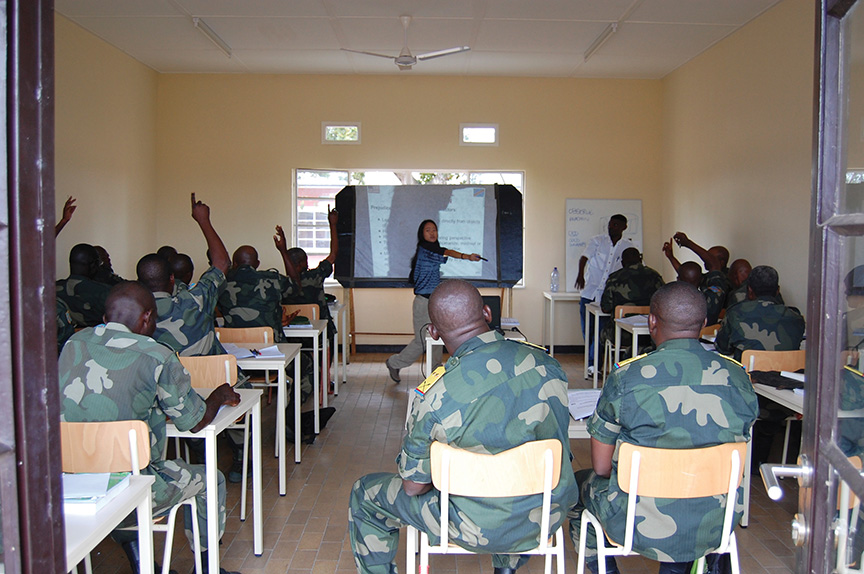
Lion Rouge Launches a New Era in U.S.-DRC Cooperation
ADF STAFF
The Armed Forces of the Democratic Republic of the Congo (FARDC) and the United States teamed up in September 2013 to conduct Lion Rouge. The 26-day military cooperation event brought together 225 FARDC officers and more than 40 U.S. personnel. One of Lion Rouge’s goals was to consolidate multiple security-related training events that previously took place across the DRC, in order to maximize resources and synchronize efforts.

Organizers chose the Kitona Air Base (BAKI) as a focal point for the training because of its location — near where the Congo River and the Atlantic Ocean meet –– in addition to its facilities. BAKI is home to an infantry school, noncommissioned officer training, a nursing school and an artillery school, as well as a teaching hospital and a large airfield. The timing of the event coincided with new recruit training for 3,000 Soldiers. Most important, however, the location allowed contact with the civilian community living around the air base, whose members were incorporated into the Lion Rouge training events.
Some of the highlights at Lion Rouge 2013 included the following:
- Kitona hospital personnel received medical training, practicing the diagnosis of ear infections and malaria, open-wound care, taking vital signs, patient monitoring and patient education. In addition, the U.S. donated 250 medical books and journals to the hospital and the FARDC nursing school.
- Agriculture specialists from the Texas-based Borlaug Institute for International Agriculture spent time at a farm where vegetables, swine and poultry are raised to feed Soldiers at Kitona. They assessed farming techniques and gave advice on how to increase production.
- A public health analysis of the base was jointly conducted by the U.S. and Congolese team, which made recommendations on how water distribution, food preparation, waste management and general sanitation could be improved to prevent disease outbreaks.
- A FARDC Magistrates Judicial Seminar was conducted focusing on human rights law, international humanitarian law, the law of armed conflict, ethics and preventing corruption, and international criminal law. Sessions stressed the appropriate way for the military to interact with civil society.
- A Gender-Specific Issue Seminar was offered, with 41 female Soldiers and nine female police officers participating.

Among those invited to the events were the mayor and the police chief of Muanda, local educators and clergy members, who came away impressed with the professionalism of the Lion Rouge training. The Kitona Air Base commander, FARDC Brig. Gen. Moustapha Mukiza, summarized the success of Lion Rouge and placed particular emphasis on a public health report recommending improvements: “With your report and support in the future, I know that we can make BAKI a great place for our Soldiers and their families.”
Plans are underway for Lion Rouge II in 2014, with officials considering adding international narcotics and law enforcement training to the curriculum. They also would like to include international partners, such as the United Nations and the European Union.
